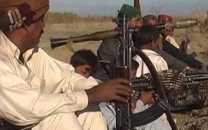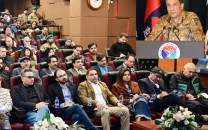2016: The most turbulent year for Altaf Hussain?
Looking back at what happened to one of Karachi's most powerful parties after it broke into factions

Govt says charging Altaf a ‘sensitive’ matter
Independent observers believe that establishment wanted this to happen and played its cards accordingly, but Altaf and his party had apparently forgotten that there was a method to the madness.
When Altaf made a blunder in his telephonic speech to his party leaders and workers sitting at a hunger strike camp outside Karachi Press Club on August 22, the establishment gauged that it was the right time to hammer what it believes will be the last nail in the coffin of his political career. During that time there was a media ban on Altaf, which still exists.
"[Altaf's] overwhelming power over Karachi, which has the second largest seaport in the country after Gwadar, was deemed a threat by the investors of the China-Pakistan Economic Corridor (CPEC)," said Sheikh Mutahir Ahmed of Karachi University. The MQM had become a militant force that could shut down the entire financial hub of the country on a couple of minutes' notice, he said, adding that China expressed its reservations over this with the Pakistani authorities before the start of CPEC. "The notion that the law and order situation in the city had worsened to an extent that the authorities were left with no option but to start a crackdown against the MQM is actually a veil over the fact that China's business interests did not want the party to continue with the unaccountable power."
During the times when General (retd) Pervez Musharraf was in power, the MQM accumulated as much muscle and finances as it could and emerged as a state within a state. Its ground structure spread across the bustling metropolis not only served its political interests but tried to assert itself as a parallel policing and judicial institution. This was when the party's downfall began.
Now that the party has split, all three recently surfaced factions are trying to disown that particular time, as if it were the dark ages. None of the factions admit that they are at least partially responsible for the wrongs, not to mention the massive land grabbing, extortion and targeted killings rampant back in those days. The untold stories of the Baldia factory fire are a stark reminder of how the voices were silenced.
9 amazing things that happened in Pakistan in 2016
In the meantime, the establishment also seems to be confused over which faction it should pamper or patronise among the MQM-Pakistan and PSP. The case of MQM-London is not being considered by policy-makers, at least in the current scenario. There is a tug of war between the two of them over asserting themselves as the 'true' saviour of the muhajirs, the community that the unified MQM throughout its span has claimed to be a sole representative of.
Published in The Express Tribune, January 1st, 2017.



















COMMENTS
Comments are moderated and generally will be posted if they are on-topic and not abusive.
For more information, please see our Comments FAQ